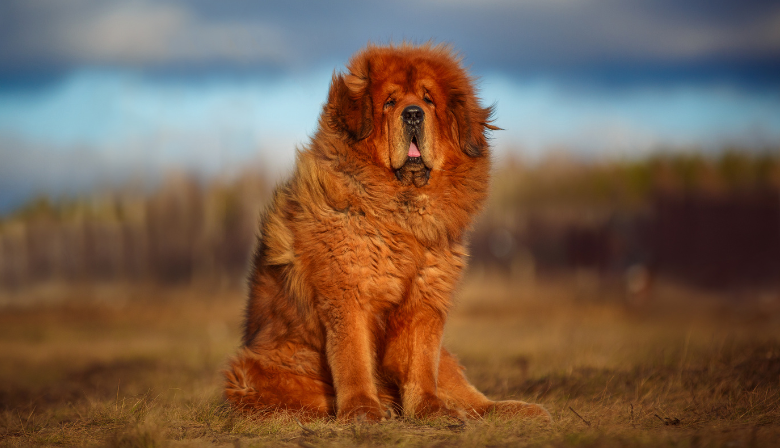A Complete Guide to Tibetan Mastiff

The Tibetan Mastiff, an ancient and noble breed, has captured the hearts of many dog enthusiasts with its impressive size, dignified appearance, and loyal nature. Originating from the Himalayan region, these majestic dogs have a rich history and unique characteristics that set them apart from other breeds. This guide delves into everything you need to know about the Tibetan Mastiff, from its origins to care requirements.
1. History and Origin
The Tibetan Mastiff has a long and storied past, dating back thousands of years. They were initially bred by nomadic cultures of Tibet, China, Nepal, and India to protect sheep from predators like wolves and leopards. Tibetan Mastiffs were also revered as guardians of monasteries and homes. Their imposing size and alert nature made them formidable protectors in the harsh Himalayan landscape. This breed is not only a part of Tibetan culture but also a symbol of status and pride among Tibetan nomads.
2. Physical Characteristics
Tibetan Mastiffs are known for their massive build and striking appearance. Some key physical traits include:
- Size: Males typically stand between 26 to 30 inches at the shoulder, while females range from 24 to 28 inches. They can weigh anywhere between 70 to 150 pounds or more.
- Coat: They have a double coat consisting of a thick, woolly undercoat and a coarse outer coat. Their fur is dense, which helps them withstand harsh weather conditions.
- Color: The Tibetan Mastiff comes in various colors, including black, brown, gray, and gold, often with tan or white markings.
- Distinctive Features: This breed has a broad head with a strong jaw, and their eyes are usually dark brown, exuding an intelligent and watchful expression. Their bushy tail curls over their back, adding to their majestic aura.
3. Temperament and Personality
Tibetan Mastiffs are known for their independent and protective nature. They are loyal to their families but can be aloof or reserved around strangers. This breed is:
- Protective: True to their guardian origins, they are naturally wary of strangers and have strong protective instincts. Early socialization is crucial to help them differentiate between friend and foe.
- Independent: Unlike many other breeds, Tibetan Mastiffs are known for their independent streak. They are not overly clingy and can be somewhat stubborn, which may pose a challenge for first-time dog owners.
- Affectionate with Family: Despite their aloofness with strangers, they are known to be affectionate and gentle with their family members, especially children. However, they need to be taught boundaries early on to ensure they interact well with kids and other pets.
4. Training and Socialization
Training a Tibetan Mastiff requires patience, consistency, and a firm yet gentle approach. Here are some key training tips:
- Start Early: Begin training and socialization from a young age to help them become well-adjusted adults. Introduce them to various people, places, and situations to reduce their natural wariness of strangers.
- Positive Reinforcement: Use positive reinforcement techniques such as treats, praise, and affection. Harsh training methods can lead to a stubborn and uncooperative dog.
- Consistency is Key: Tibetan Mastiffs are intelligent but can be stubborn. Consistent training with clear rules and boundaries will help establish a respectful relationship between you and your dog.
5. Exercise and Activity Levels
Despite their large size, Tibetan Mastiffs are not as high-energy as some other breeds. However, they do require regular exercise to keep them physically and mentally stimulated.
- Moderate Exercise: Daily walks and playtime are essential, but they do not need intensive exercise like some working breeds.
- Mental Stimulation: Engage them in activities that challenge their minds, such as puzzle toys or obedience training exercises.
6. Grooming and Maintenance
The Tibetan Mastiff’s thick double coat requires regular grooming to keep it in good condition.
- Brushing: Brush their coat at least once a week to remove loose hair and prevent matting. During the shedding season (usually once a year), more frequent brushing is necessary.
- Bathing: Bathing can be done as needed, but not too frequently, as their coat has natural oils that keep it healthy. For professional grooming services, you can opt for dog grooming in Delhi to ensure your Tibetan Mastiff receives the best care.
- Nail Care and Dental Hygiene: Regular nail trimming and dental care are also essential to keep your Tibetan Mastiff healthy.
7. Health and Lifespan
Tibetan Mastiffs are generally healthy dogs, but like all breeds, they are prone to specific health issues. Common health concerns include:
- Hip Dysplasia: A common condition in large breeds, where the hip joint doesn’t fit together correctly.
- Thyroid Issues: Hypothyroidism is a condition that can affect the breed’s metabolism.
- Ear Infections: Due to their floppy ears, they can be prone to ear infections if not cleaned regularly.
The average lifespan of a Tibetan Mastiff is around 10 to 12 years, which is relatively long for a large breed.
8. Is the Tibetan Mastiff Right for You?
Tibetan Mastiffs are not suitable for everyone. They require a dedicated owner who understands their unique temperament and needs. They thrive in homes with spacious yards where they can patrol and feel a sense of duty. Apartment living may not be ideal for this breed. If you have experience with large, independent dogs and are looking for a loyal, protective companion, the Tibetan Mastiff could be a great match.
Conclusion
The Tibetan Mastiff is a magnificent breed with a rich history and a unique personality. They are loyal, protective, and dignified, making them excellent guardians and companions for the right owner. Proper training, socialization, and care are crucial to ensure they grow into well-behaved and loving members of the family. If you’re prepared for the commitment, the Tibetan Mastiff can be a rewarding and loyal companion. For expert guidance and healthcare tailored to your Tibetan Mastiff’s needs, you can visit the best dog clinic in Delhi to ensure they receive the highest quality care.


